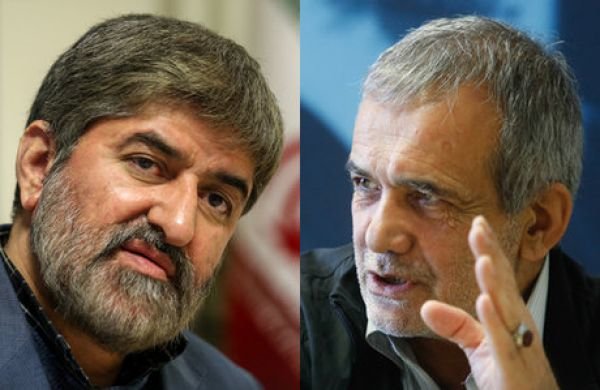Iranian lawmakers uncertain about parliamentary leadership

TEHRAN – Amid uncertainty over the fate of two prominent lawmakers, some members of the pro-reform Hope parliamentary bloc have pledged to do everything they can in order to keep Masoud Pezeshkian and Ali Motahari in the presiding board of the parliament.
“Some factions are in disagreements on the two deputies but we, as members of the Hope faction, have announced that keeping Pezeshkian and Motahari [in parliament’s leadership] is our read line,” Parvaneh Salahshouri, a reformist lawmaker, said on Monday.
As competition between different parliamentary factions intensifies, On Sunday the parliament announced that the session for its leadership elections will be held next Wednesday.
Iranian lawmakers elect their speaker and deputy speakers during the first session of parliament for a one-year term. The session is usually held in May, however, this year it was postponed to June 7.
For nine years, members of the parliament have been voting for Ali Larijani to be the speaker of Parliament. Following the 2016 parliamentary elections, which were a major shake-up in the parliament, the lawmakers elected Masoud Pezeshkian and Ali Motahari as first and second deputy speakers respectively.
During last year’s election, the reformists and moderates formed a coalition under the “List of Hope” and managed to win 41.03% of the seats, more than that of the principlists and independents – if counted separately.
In recent days, however, some parliamentarians have expressed concern about the future of Motahari in parliament’s leadership. According to unverified reports, some members of the Hope bloc have formed a coalition with the principlists to remove him from the presiding board.
On Saturday, Mohammad Reza Aref, the leader of the Hope faction, said the bloc wants Motahari and Pezeshkian to stay in the leadership, and is doing whatever it can to reach that end.
He also said negotiations are underway between different factions of the parliament in order to reach an agreement on the presiding board.
Aref has been among the top decision-makers of the reformist faction since 2013 presidential election, when he withdrew his candidacy in favor of Hassan Rouhani, paving the way for his presidency. After winning a seat in parliament in 2016, he challenged Larijani for the position of speaker but Larijani was re-elected.
Mahmoud Sadeqi, another reformist parliamentarian from Tehran, has accused “certain ministers” of interfering in the parliament’s affairs.
“If some ministers intervene one more time in the presiding board elections, I won’t remain silent,” Sadeqi tweeted.
Communications and Information Technology Minister Mahmoud Vaezi responded to what he called “rumors” about the Rouhani administration’s interference in the Parliament, ruling out any interference by the administration.
“Such rumors aim at straining the good relations between the government and the Majlis,” Vaezi posted on his Instagram account.
Sadegh Zibakalam, a renowned political analyst and professor at Tehran University, has also spoken out against any decision to unseat Motahari, noting that if true he’s disappointed at some members of the Hope faction for trying to unseat the two deputies.
Motahari stands head and shoulders above all 120 members of the Hope faction, Zibakalam said, reaffirming his support for the outspoken lawmaker.
A reform-minded principlist MP, Motahari is a strong proponent of civil rights and critic of both principlists and reformists.
MH/PA
